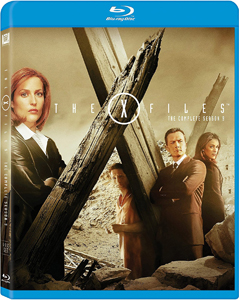Although the common perception is that “The X-Files” went out with a whimper in Season 9 (2001-02, Fox), I actually found this to be a strong batch of episodes. On the downside, Annabeth Gish (as Monica Reyes) never quite materializes as a worthy partner to Robert Patrick, who by this time had made John Doggett almost as iconic as Mulder and Scully.
Scully the mentor
On the plus side, Season 9 doesn’t ride on the new partnership. Scully is in every episode, too, sort of as a mentor to Doggett and Reyes; supervisors like Skinner, Follmer and Kersh and super soldiers played by Lucy Lawless, Adam Baldwin and Alan Dale get a lot of screen time; and by the final episode, there are a record five people in the opening credits. With David Duchovny unavailable until the final two hours, “The X-Files” opted to become an ensemble drama, and this was the right decision.
When they first aired, I had serious problems with “Jump the Shark” and “The Truth” (the two-part finale), which to this day are still the most controversial episodes of the series. I liked them more this time around, though. The deaths of the Lone Gunmen are easier to take nine years later.

“The X-Files” Season 9 (2001-02)
Fox, 20 episodes
Creator: Chris Carter
Stars: Gillian Anderson, Robert Patrick Annabeth Gish
And while I still wonder if the writers could’ve come up with something more epic than a courtroom drama for the finale, there is a certain satisfaction that comes from the parade of familiar faces recounting the mythology for the record, complete with classic clips.
Glorified temps?
I don’t like that the finale leaves the fate of Doggett’s and Reyes’ jobs on The X-Files unresolved, but I now understand that they were never more than glorified temps anyway. Mulder and Scully deserve that final scene where they express hope in the face of the alien-colonization date: Dec. 22, 2012. (That might not be a bad day to release the third movie; just a suggestion.)
While Doggett and Reyes are left in limbo at the end, they do get lots of great standalone episodes before that. Season 8 was packed with mythology episodes, but Season 9 gives us a better variety: Some myth episodes about super soldiers, sure, but also strong character pieces (Scully protecting her baby and missing Mulder, Doggett trying to find out who killed his son, Reyes trying to expose Doggett’s softer side), quirky Darin Morgan-style hours, and throwback monster-of-the-weeks.
So while “The Truth” definitively reminded me that “The X-Files” as a whole belonged to Mulder and Scully, Season 9’s best episodes belonged to Doggett and Reyes, suggesting a bright future for “The X-Files” that, unfortunately, never came to be.
Here are my rankings of the 20 episodes:
1. “Lord of the Flies” (episode 5, written by Thomas Schnauz)
“The O.C.’s” Samaire Armstrong makes an appearance in an episode that stands on par with “Hungry,” “Rush,” “Syzygy” and “D.P.O.” as an “X-Files” episode that explores the horrors of youth. Here, a teenager can control bugs — but, of course, he doesn’t really have control over his powers.

2. “Release” (17, John Shiban and David Amann)
Much like “Closure” wrapped up the Samantha arc in Season 7, “Release” gives Doggett closure on his murdered son’s case before the series ends. The ending is ambiguous, but if I’m reading it right, it was Follmer who killed Doggett’s son. That’s a surprising twist, and I’m also surprised that I didn’t remember it from my first viewing.
3. “Sunshine Days” (18, Vince Gilligan)
One last blast of quirkiness chronicles a guy (Michael Emerson from “Lost”) who appears to live in the “Brady Bunch” house. Once you get past that jolt, this is a strong episode that provides an emotional coda for the MOTW portion of “The X-Files.”
Scully desperately wants proof of the paranormal to vindicate her and her colleagues’ nine years of work on the X-Files. She doesn’t get it, but she comes to the realization that the journey was its own reward — and with that message, I suspect Chris Carter and Frank Spotnitz were sharing their own take on the series while also bracing fans for the following week’s finale.
4. “Audrey Pauley” (11, Steven Maeda)
In a rare case of an actor coming back to play a different character on “The X-Files,” Tracey Ellis (Lucy Householder in “Oubliette”) returns. Like Lucy, Audrey is empathetic, and she provides the emotional touchstone as — in a role reversal from “4-D” — Doggett desperately tries to save the life of Reyes, who is trying to escape the psychological dimension she’s trapped in.
5. “Improbable” (13, Chris Carter)
I dreaded rewatching this episode, remembering it as being an intolerable hammer blow of whimsy. But I appreciated it this time as a more upbeat take on Season 3’s “Clyde Bruckman’s Final Repose,” again with an all-knowing person tracking the movements of a serial killer. Unlike Peter Boyle’s character, Burt Reynolds’ unnamed godlike figure isn’t suicidal; rather he takes pleasure in his station in life.
6. “Hellbound” (8, Amann)
The brother of Patrick Swayze is among a strong guest cast in this deliciously grisly old-school standalone about people mysteriously being skinned.
7. “4-D” (4, Maeda)
This is a prime example of how much Doggett overshadows Reyes. Gish does most of the heavy acting here, yet I think of this as a great Patrick performance, even though Doggett is just lying paralyzed in a hospital bed. This episode provides the first hint of the Doggett-Reyes romance, which would be revisited a few times and then left hanging when the series ended.
8. “Trust No 1” (6, Carter and Frank Spotnitz)
Gillian Anderson totally sells the Scully-Mulder relationship simply by longingly reading emails from her AWOL partner. This episode has a scene where we see Mulder in a rock quarry from a distance. On the first airing, I couldn’t help but note how the writers were blatantly working around Duchovny’s absence; this time, I appreciated the imagery of how Mulder remained just out of Scully’s reach.
9. “Underneath” (12, Shiban)
A meat-and-potatoes Jekyll-and-Hyde yarn, with a decent guest turn by the guy who is wrongly (but understandably, given the evidence) accused of a string of murders.
10-11. “Nothing Important Happened Today” (1, Carter and Spotnitz)/“Nothing Important Happened Today II” (2, Carter and Spotnitz)
The plot thickens with the super soldiers, among whose number may be Scully’s baby, William. Lucy Lawless as a super soldier without a sense of modesty is among the highlights of this season-launcher.
12-13. “Provenance” (9, Carter and Spotnitz)/“Providence” (10, Spotnitz and Carter)
Just some good, old-fashioned myth-arc stuff, but more personal than ever before because Scully’s baby is kidnapped.
14. “Scary Monsters” (14, Schnauz)
The Mulder-and-Scully-worshipping Leyla Harrison (from Season 8’s “Alone”) returns in this case about a boy whose imagination becomes reality. Thematically, it can be lumped in with movies like “Forbidden Planet,” “Solaris,” “Event Horizon” and “Sphere,” but it doesn’t add much to the subgenre.
15. “John Doe” (7, Gilligan)
Another acting showcase for Patrick finds Doggett waking up in Mexico with no memory of anything. It’s a bit hard to watch simply because the situation is frighteningly dire, but Patrick is great, as always.
16-17. “The Truth, Part 1” (19, Carter)/“The Truth, Part 2” (20, Carter)
Sure, the courtroom setting as a template for bringing back old characters and ideas smacks of playing it safe. Still, when you consider that Carter and Co. never really had a grand finale in mind, this isn’t bad; in fact, it’s satisfying to see (almost) everything wrapped up in a tidy bow.
Also, at least one fresh fact stuck with me this time around: The Cigarette-Smoking Man is indeed Mulder’s father (and Jeffrey Spender’s half-brother). For some reason, I didn’t catch that revelation the first time around (probably because it’s not played up thematically; still, I guess it’s an important thing to know as an X-Phile).
18. “Jump the Shark” (15, Gilligan, Shiban and Spotnitz)
In this wrap-up of the dangling threads from “The Lone Gunmen,” Langly, Byers and Frohike die heroically. The killing off of the Gunmen bothered me ever since this episode aired, right up until the moment when I rewatched it, and now I’m OK with it. I guess subconsciously I just needed time to accept it.
19. “Daemonicus” (3, Spotnitz)
Doggett and Reyes’ first case together — centered on the creepy idea that people are being picked off based on their names — depends entirely on mood. But in a rare misfire, writer-director Spotnitz doesn’t quite provide it, so what could’ve been a great episode is instead forgettable.
20. “William” (16, David Duchovny, Spotnitz and Carter)
On first viewing, I thought it was utterly ridiculous to suggest that a horribly scarred man who turns up at the X-Files office might be Mulder (especially since it was clearly not Duchovny in the role). And then it got more silly when it turned out to be Jeffrey Spender, who was shot in the head the last time we saw him. A sympathetic turn by Spender actor Chris Owens notwithstanding, it was still ridiculous on this viewing.
How would you rank the episodes from Season 9?
And how would you rank the nine seasons? My rankings are 3, 6, 1, 4, 8, 2, 9, 5, 7.
Up next, I’ll wrap up my journey down “X-Files” memory lane with a review of the second (and most recent) movie, 2008’s “I Want to Believe.”

